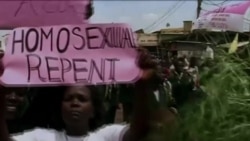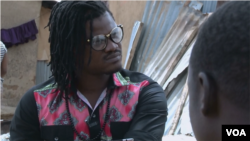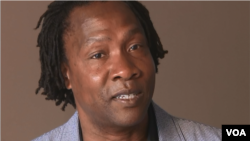It’s a tough time to be gay in Africa, where 37 countries have banned homosexuality and where, at least in parts of the sub-Saharan region, HIV/AIDS rages.
Anti-gay laws complicate the jobs of health care workers such as Ifeanyi Orazulike, who runs a clinic for gay men and transgender people in a poor area of Abuja, Nigeria’s capital. While the country’s prevalence of HIV infection was a relatively low 3.1 percent overall in 2012, it affected 17 percent of gay men.
“The world is saying we want an HIV/AIDS-free generation,” says Orazulike, who is 33 and not infected. “We can’t achieve that without including [health care for] men who have sex with men. We can't achieve that without involving transgender people.”
In January, Nigeria imposed a controversial law banning same-sex marriage and civil unions; violators face up to 14 years in prison. The new rule, approved by President Goodluck Jonathan, prohibits gays from public displays of affection, from gathering in groups or from “aiding and abetting” homosexuality, threatening up to 10 years behind bars.
Uganda followed suit in February with its own harsh anti-gay law, one that carries a life sentence for repeat offenders.
The U.S. State Department has objected to both measures.
President Barack Obama called Uganda’s Anti-Homosexuality Act “odious.” And in June, the U.S. government announced sanctions against the country. Among them: travel bans on individuals involved in human rights abuses, cuts in funding for its police force, and a shift in funding from the national health ministry to other organizations.
Religion plays a role
Such anti-gay policies are, at least in part, a product of American evangelical influence, says Roger Ross Williams, director of “God Loves Uganda.” The 2013 documentary film looks at how it has shaped the African country’s politics and policies.
Some fundamentalist Christian conservatives, “frustrated with losing the culture wars here in America, have focused on sub-Saharan Africa in a big way” for roughly 30 years, he says in a phone interview.
And some American-led Bible study classes teach that God does not love gays, his film shows. “That is not God’s way for love,” one instructor says in Williams’ film, excerpted in VOA’s documentary.
“Nigeria and Uganda now are producing these pastors that were raised on this sort of idea that biblical law is above civil law,” Williams says in the documentary.
"You get people, these mobs of people who are protesting, who are screaming, ‘Kill the gays! Death to the gays!’ But it's not really about the gays – it’s about them being frustrated with their own lives,” Williams says. And, he adds, it’s about “the government using gay people as a scapegoat."
One prominent voice belongs to Scott Lively, president of Defend the Family International, a U.S.-based nonprofit group. An evangelical minister and lawyer, he has lectured in Uganda about homosexuality as a threat to family and society. (He was sued in 2012 in federal court in his home state of Massachusetts, on behalf of a Ugandan group, for crimes against humanity.)
"My goal is always to discourage sexual promiscuity of every sort. I believe that governments, all the governments of the world, have an affirmative duty to promote the natural family and marriage as the mainstream culture," he tells VOA in “AIDS: Living in the Shadows,” echoing sentiments in his 2009 letter from Uganda to his organization’s Pro-Family Resource Center.
Lively objects to the notion that he or other American religious have shaped legislation in Uganda or Nigeria.
"At best, it is paternalistic colonialism, at worst it is outrageously racist, to suggest that the Africans are children who cannot make up their minds about what morality their country should follow," he says.
Access to care curbed
Meanwhile, Orazulike bemoans the situation for Nigerian gays and transgender people who need health care. He says Nigeria’s law fosters fear and violence that drive them away from medical attention. Before its implementation, 15 new patients walked into his clinic every week, he says. Now he sees four.
"We can’t keep quiet for people to die or for people to lose their life,” Orazulike says in the documentary, where he’s shown meeting with a man who’s been beaten. “... We are battling the law because even people like us stand to go for 10 years' imprisonment for doing what we are doing."
Health officials in Uganda and Nigeria maintain the new anti-gay laws will lower HIV infection rates.
In Nigeria, Mike Omeria, presidential spokesman, says no one is being denied health services because of the law.
“Treatment for any kind of disease in Nigeria is open to all citizens irrespective of their status,” he says. "Where the law is concerned is, when gays would go and congregate and shout that 'we are gays and we are making love on the street,' and all of that, then the law frowns at that. And treatment for any kind of disease in Nigeria is open to all citizens irrespective of their status."
Director Williams says that, while making his film, he saw things differently: "You cannot walk into a clinic. You cannot get drugs if you are HIV-positive in Nigeria. It’s nearly impossible. You are so restricted. You are so stigmatized. You are so discriminated against by the health care industry."
Revised approach
Orazulike presses on.
“We’ve changed strategy in how we provide services at the moment,” he says by phone in early July, explaining that he now meets with people one on one, not in groups, to counsel and distribute information and condoms. “Services keep shrinking by the day. It has been very difficult. ... I feel discouraged.”
"When I wake up, every day I want to do more,” Orazulike says in VOA’s documentary. “I want to see people smile. I want to see equality that is achieved across board in Nigeria, some day of our life."
Williams calls the health care worker “absolutely a hero.
“I think it is very hard for people in the West to understand exactly ... the hostility and the hatred that he is up against,” the director says. “And that fact that he refuses to back down and goes into the fire and faces it is unbelievable. Unbelievable."
VOA's Carol Guensburg contributed to this report. Abraham Archirga did photos.







